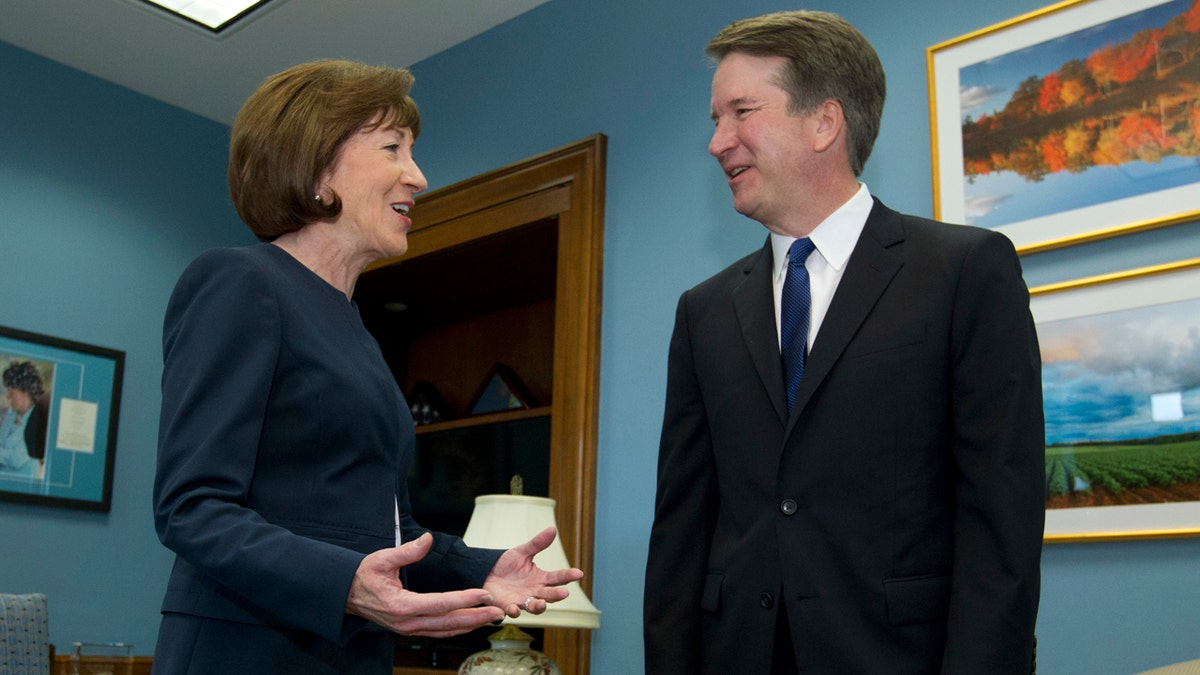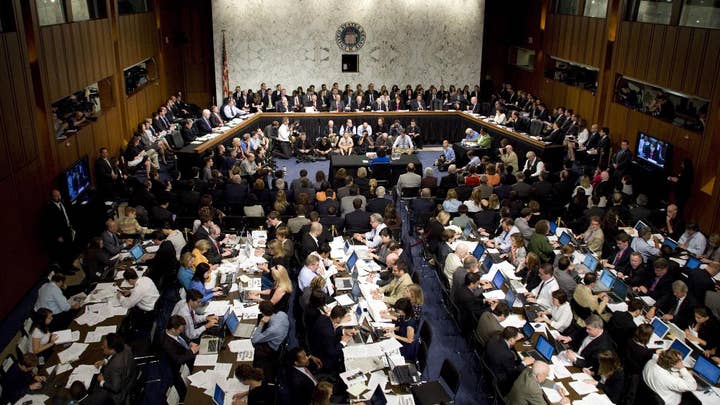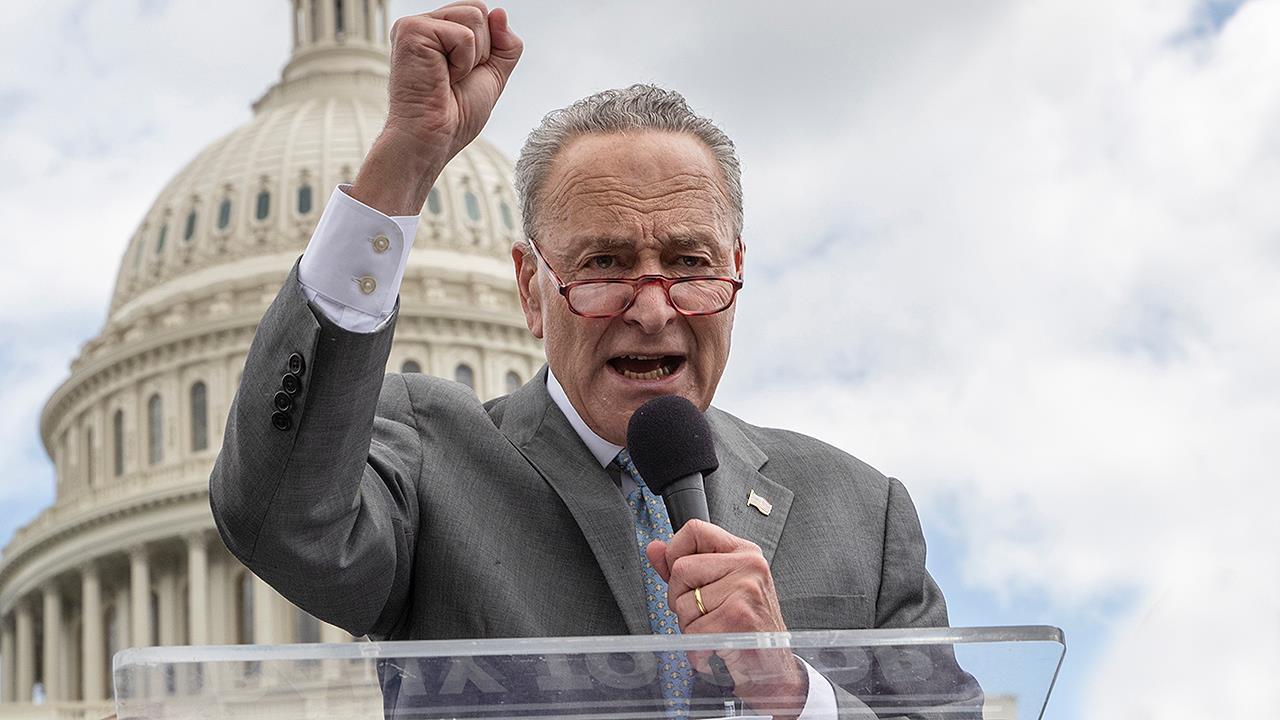
Sen. Susan Collins, R-Maine, speaks with Supreme Court nominee Judge Brett Kavanaugh at her office, before a private meeting on Capitol Hill in Washington on Tuesday, Aug. 21, 2018. (Associated Press)
Judge Brett Kavanaugh views Roe v. Wade as "settled law," U.S. Sen. Susan Collins, R-Maine, said Tuesday after meeting with President Trump's Supreme Court pick. But abortion rights activists and Democrats remained unconvinced that Kavanaugh won't try to restrict abortion access from the bench.
In a two-hour meeting, Collins said Kavanaugh told her he agrees with Chief Justice John Roberts, who called the 1973 Roe v. Wade case that legalized abortion "settled law" during his confirmation hearings in 2005.
"We talked at great length about precedent and the application of stare decisis to abortion cases," Collins said, using the legal term for settled precedent.
Kavanaugh's views on abortion are of major importance to Collins, who has vowed to oppose Kavanaugh's nomination if shows "demonstrated hostility" toward Roe v. Wade.
Collins described their discussion as "productive" and "informative," but said she would not decide how to vote until after the Senate Judiciary Committee holds confirmation hearings on Kavanaugh next month.
Meanwhile, Ilsye Hogue, president of NARAL Pro-Choice America, said in a statement that Collins should not be reassured by Kavanaugh about abortion issues, CentralMaine.com reported.
“With all due respect to Senator Collins, ‘settled law’ means nothing. It is a bunch of code words, long used by many conservative judges, meant to hide their real beliefs and anti-choice record."
“With all due respect to Senator Collins, ‘settled law’ means nothing," Hogue said. "It is a bunch of code words, long used by many conservative judges, meant to hide their real beliefs and anti-choice record."
Hogue added that the current Supreme Court, led by Roberts, "has spent much of the last term re-litigating so-called ‘settled law.’"
"Most troubling of all is Senator Collins’ reference to Roberts today," she said. "Roberts has voted in lockstep with anti-abortion forces on every vote since joining the court.”
Democrats fighting Kavanaugh's ascension to the high court sought to keep up the pressure, dismissing Kavanaugh's stance on Roe v. Wade as an artful dodge.
Senate Minority Leader Chuck Schumer, D-N.Y., met with Kavanaugh later Tuesday. He said the judge refused to answer when asked directly whether Roe. V. Wade was correctly decided.
That lack of clarity, Schumer said, should "send shivers down the spine of any American who believes in reproductive freedom for women."
Schumer added that Kavanaugh has a special obligation to be forthcoming on abortion, given Trump's "litmus test that he would only appoint judges who would overturn Roe."
Kavanaugh has already met with most Senate Republicans, but winning support from Collins and Sen. Lisa Murkowski, R-Alaska, could be crucial. Both senators support access to abortion services.
Collins has never opposed a Supreme Court nominee, CentralMaine.com reported.
Kavanaugh has already met with most Senate Republicans, but winning support from Collins and Sen. Lisa Murkowski, R-Alaska, could be crucial. Both senators support access to abortion services.
Republicans have a narrow 50-49 majority in the Senate due to the absence of ailing Sen. John McCain, R-Ariz., and can't afford a single defection on Kavanaugh if every Democrat votes no.
Kavanagh, 53, is a conservative who, in replacing retired Justice Anthony Kennedy, could tip the court rightward for a generation.
Several Democratic female senators joined with advocates for women's health care Tuesday to talk about the stakes of adding Kavanaugh to the court, particularly when it comes to access to abortion services.
"This is a wakeup call," said Sen. Kirsten Gillibrand, D-N.Y. "Do not take this moment lightly."
But Republicans still hope to have Kavanaugh confirmed by the start of the court's session on Oct. 1.
The Associated Press contributed to this report.






